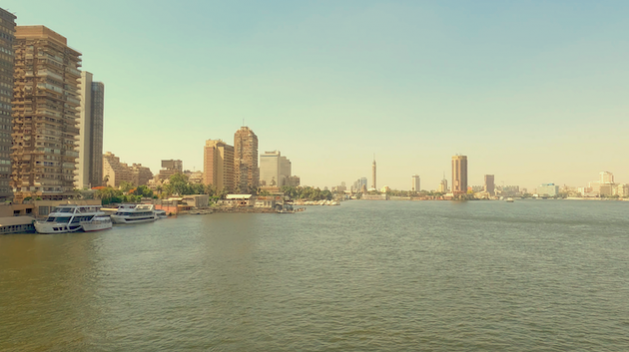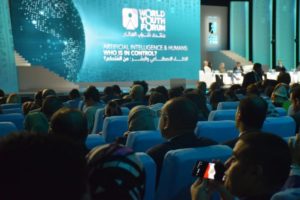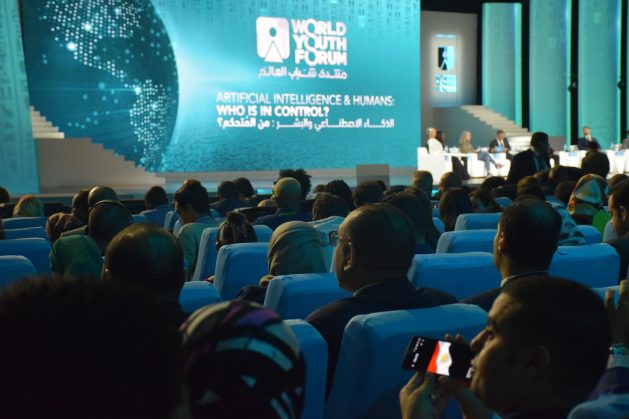
Active Citizens, Africa, Aid, Armed Conflicts, Civil Society, Development & Aid, Editors’ Choice, Education, Education Cannot Wait. Future of Education is here, Featured, Headlines, Human Rights, Humanitarian Emergencies, Middle East & North Africa, Migration & Refugees, Population, Poverty & SDGs, Sustainable Development Goals, TerraViva United Nations, Youth
Education Cannot Wait. Future of Education is here

These Sudanese refugee children are among the 748,000 refugees and asylum-seekers who have sought refuge in Egypt. Credit: ECW
– As peace eludes war-torn Sudan, thousands of displaced people fleeing the deadly battle between the Sudanese Armed Forces (SAF) and Rapid Support Forces (RSF) have found refuge in neighboring countries, including Egypt.
The Sudanese refugee population in Egypt has grown almost sevenfold in what is considered the worst displacement crisis in the world, impacting 10 million people, with at least 2 million having fled to neighboring countries, including Egypt. In Egypt, over 748,000 refugees and asylum-seekers are registered with the UNHCR, a majority of whom are women and children who have recently arrived from Sudan. This number is expected to continue to rise.
“When Sudan plunged into conflict, the international aid community, UN agencies, civil society and governments developed a response plan to meet the urgent needs of refugees fleeing Sudan to seek safety in five different countries, including Chad, Ethiopia, Egypt, South Sudan and the Central African Republic,” Yasmine Sherif, Executive Director of Education Cannot Wait (ECW), the global fund for education in emergencies and protracted crises within the United Nations, told IPS.
To put it into perspective, the 2024 Sudan Regional Refugee Response Plan calls for USD 109 million to respond to refugee education needs across the region. To date, only 20 percent of this amount has been mobilized, including USD 4.3 million—or 40 percent of the requirement for Egypt.
ECW was among the first to respond in the education sector, providing emergency grants to support partners in all five countries.
The government of Egypt has demonstrated great commitment to providing refugees with access to education services, but with 9,000 children arriving every month, the needs are overwhelming.
Consequently, nearly 54 percent of newly arrived children are currently out of school, per the most recent assessment.
Sherif says despite Egypt’s generous refugee policy, the needs are great, resources are running thin and additional funding is urgently needed to scale up access to safe, inclusive, and equitable quality education for refugee as well as vulnerable host community children.
“Families fleeing the brutal conflict in Sudan endured the most unspeakable violence and had their lives ripped apart. For girls and boys uprooted by the internal armed conflict, education is nothing less than a lifeline. It provides protection and a sense of normalcy amidst the chaos and gives them the resources they need to heal and thrive again,” she said.

Yasmine Sherif, Executive Director of Education Cannot Wait (ECW), interacts with the Sudanese refugee community in Egypt. Credit: ECW
The government of Egypt has demonstrated great commitment to providing refugees with access to education services, but with 9,000 children arriving every month, the needs are overwhelming.
On a high-level stock-taking UN mission to Egypt in August 2024, ECW, UNHCR and UNICEF are urging donors, governments and individuals of good will to contribute to filling the remaining gap and scaling up the education response for refugee and host-community children.
“We have seen the important work that is being undertaken by UNHCR, the Catholic Relief Service and local organizations. But needs are fast outpacing the response, and Egypt now has a growing funding gap of USD 6.6 million. Classrooms are hosting as many as 60 children, most of whom are from host communities,” Sherif says.
Stressing that additional resources are urgently and desperately required to ensure that refugee and host community children in Egypt and other refugee-receiving countries in the region can attend school and continue learning. With the future of the entire region at stake, ECW’s call to action is for as many donors as possible to step in and help deliver the USD10 million required here and now to adequately support the refugee and host communities.

Education Cannot Wait Executive Director Yasmine Sherif, UNHCR, UNICEF, Catholic Relief Services (CRS) staff and Sudanese refugee girls and women at the CRS office in Cairo, Egypt.Credit: ECW
“We have seen the important work that is being undertaken by UNHCR, the Catholic Relief Service and local organizations, such as the Om Habibeh Foundation. But needs are fast outpacing the response,” Sherif says.
“In the spirit of responsibility sharing enshrined in the Global Compact on Refugees, I call on international donors to urgently step up their support. Available funding has come from ECW, ECHO, the EU, Vodafone, and a few other private sector partners. We should not abandon children in their darkest hour. This is a plea to the public and private sectors, and governments to step in and deliver for conflict-affected children,” she said.
Dr. Hanan Hamdan, UNHCR Representative to the Government of Egypt and to the League of Arab States, agreed.
“Forcibly displaced children should not be denied their fundamental right to pursue their education; their flight from conflict can no longer be an impediment to their rights. UNHCR, together with ECW and UNICEF, continue to ensure that children’s education, and therefore their future, are safeguarded,” she said.
“To this end, it is crucial to further support Egypt as a host country. It has shown remarkable resilience and generosity, but the increasing number of displaced individuals requires enhanced international assistance. By strengthening Egypt’s capacity to support refugees, we can ensure that more children have access to education and eventually a brighter future,” Hamdan added.
During the high-level ECW mission in Egypt, the ECW delegation met with key strategic partners—including donors, UN agencies, and local and international NGOs—and with Sudanese refugees to take stock of the scope of needs and the ongoing education response by aid partners.
Jeremy Hopkins, UNICEF Representative in Egypt, reiterated the agency’s commitment.
“UNICEF is steadfast in its commitment to ensure that conflict-affected Sudanese children have the opportunity to resume their education. In Egypt, through innovative learning spaces and the Comprehensive Inclusion Programme, UNICEF is working diligently, under the leadership of the Egyptian government, in cooperation with sister UN agencies and development partners, to create inclusive learning environments and strengthen resilient education systems and services,” Hopkins said.
“This not only benefits displaced Sudanese children but also supports host communities by ensuring that all children have access to quality education.”
In December 2023, ECW announced a USD 2 million First Emergency Response Grant in Egypt. The 12-month grant, implemented by UNHCR in partnership with UNICEF, is reaching over 20,000 Sudanese refugees in the Aswan, Cairo, Giza and Alexandria governorates.

Sudanese displaced children in Egypt are falling behind in their education. Education Cannot Wait has made a global appeal for funds to ensure they are able to continue with their education. Credit: ECW
The grant supports interventions such as non-formal education, cash grants, social cohesion with host communities, mental health and psychosocial support, and construction and refurbishment work in public schools hosting refugee children to benefit both refugee and host community children. As conflict escalates across the globe, ECW is committed to ensuring that all children have a chance at lifelong learning and earning opportunities.
Beyond Egypt, ECW has allocated USD 8 million in First Emergency Response grants in the Central African Republic, Chad, Ethiopia and South Sudan to address the urgent protection and education needs of children fleeing the armed conflict in Sudan. In Sudan, ECW has invested USD 28.7 million in multi-year and emergency grants, which have already reached more than 100,000 crisis-affected girls and boys.
During the mission, ECW called on leaders to increase funding for the regional refugee response and other forgotten crises worldwide. ECW urgently appeals to public and private donors to mobilize an additional US$600 million to reach 20 million crisis-impacted girls and boys with safe, quality education by the end of its 2023–2026 strategic plan.
IPS UN Bureau Report




